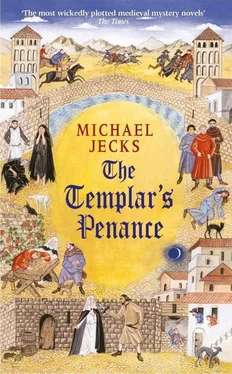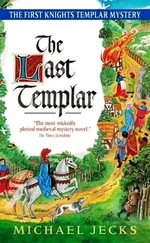Michael Jecks - The Templar
Здесь есть возможность читать онлайн «Michael Jecks - The Templar» весь текст электронной книги совершенно бесплатно (целиком полную версию без сокращений). В некоторых случаях можно слушать аудио, скачать через торрент в формате fb2 и присутствует краткое содержание. Год выпуска: 2014, ISBN: 2014, Издательство: Headline, Жанр: Исторический детектив, на английском языке. Описание произведения, (предисловие) а так же отзывы посетителей доступны на портале библиотеки ЛибКат.
- Название:The Templar
- Автор:
- Издательство:Headline
- Жанр:
- Год:2014
- ISBN:9781472219763
- Рейтинг книги:4 / 5. Голосов: 1
-
Избранное:Добавить в избранное
- Отзывы:
-
Ваша оценка:
- 80
- 1
- 2
- 3
- 4
- 5
The Templar: краткое содержание, описание и аннотация
Предлагаем к чтению аннотацию, описание, краткое содержание или предисловие (зависит от того, что написал сам автор книги «The Templar»). Если вы не нашли необходимую информацию о книге — напишите в комментариях, мы постараемся отыскать её.
The Templar — читать онлайн бесплатно полную книгу (весь текст) целиком
Ниже представлен текст книги, разбитый по страницам. Система сохранения места последней прочитанной страницы, позволяет с удобством читать онлайн бесплатно книгу «The Templar», без необходимости каждый раз заново искать на чём Вы остановились. Поставьте закладку, и сможете в любой момент перейти на страницу, на которой закончили чтение.
Интервал:
Закладка:
Michael Jecks
The Templar's Penance
Prologue
It was an unnaturally cool morning in this part of northern Spain, when the youth who had got there first gave a whoop of triumph from the top of the rise which men called Montjoie , the Mountain of Joy. At least in those last moments before he died, the youngster knew absolute pleasure of a kind which he could never have known while slaving in the fields. He was only a damned peasant, after all, Gregory thought, watching him.
He was an unprepossessing specimen, this boy, with a face all scarred from the pox; he had the shoulders of an ox and flesh burned black by the sun and the wind. Gregory had an urge to snap at him for presuming to run on ahead of the group, but he swallowed his irritation. He would try to take the lad aside later and give him a bit of a talking-to.
It had been a longstanding ambition of Gregory’s to be awarded that glorious title of ‘King’ just for having been the first to reach the summit and see their destination. Many pilgrims would pay it no mind, but Gregory did. He had wanted to rise early in the morning and come here to this hill and see the sacred city of Santiago Matamoros, Saint James the Moorslayer, shimmering in the distance, to stand on this knoll in splendid solitude, listening to the birds and drinking in the view while he offered his thanks to God. It was a dream which he had enjoyed periodically during the long journey here, and now it was gone. He had hoped that he could commune with God alone up here and find some comfort; merely catching a glimpse of Santiago was supposed to make a man more acceptable to God, after all, and Gregory needed all the help he could get.
It wasn’t the boy’s fault. Gregory could hardly blame him for taking the lead. It was just his luck! If only the group hadn’t collapsed last night when they had stopped for shelter. They were all exhausted after stamping through torrential rain for hours; the weather here was worse than Gregory’s worst memories. The refuge of a small barn had called to them, and then a cheerful woman had brought them a steaming dish of pottage. No, there was no possibility of their carrying on after that, which was why they didn’t arrive at the stream until this morning.
The sun was feeble today, but compared with the terrible rains of yesterday it felt wonderful. At least they could walk in the dry. The dust had been settled by the dampness, so they didn’t suffer the irritation of inhaling the stuff as their boots stirred it. Not like the South of France, where Gregory had coughed almost all the way, choking in the thickly laden air. Warmed and rested, the group had woken refreshed and ready for the last part of their pilgrimage. Some had only travelled a few tens of miles, but many had covered hundreds. Some, like Gregory, had walked perhaps more than a thousand to get here. God, but he’d needed to wash his feet!
This river, the Lavamentula, was enclosed in a small wood, and the warm, green-tinged light had a curious effect on them all. It was as though they all realised that they were entering a holy site. Light was sprinkled on the ground in pools of gold; the thin scattering of weedy plants beneath the trees looked somehow blessed as they were touched by it. In the clear morning’s sunshine even the dark, barren-looking soil was given a glowing aspect, as though new life was about to burst from it.
One of the first there, Gregory had eagerly stripped and washed with the rest of them. After the journey, all were gritty and rank. Even with the weather so cool, they had built up sweat from many days of travelling, and the pilgrims all needed to scrape themselves clean. Gregory himself felt the bathing to be almost a spiritual experience, a preliminary ritual so that he might arrive at the Saint’s altar cleansed. There was a curious silence as he rubbed vigorously at his armpits and groin, an expectant stillness broken only by the sound of trickling water — and gasps as cold water shocked cringing flesh.
While he wiped himself dry, he watched the others. He was struck more by the differences between them than by the superficial similarity given to them by their broad hats and capes. Yes, they all wore the same basic clothes, many with the cockleshell symbol of Santiago, but their attitudes were clearly at odds with each other.
Some splashed enthusiastically like children, bawling loudly at the cold, spraying each other and laughing, while others stood silently contemplative, preparing themselves for the day, readying themselves for actually seeing the church, perhaps sad that the end of their journey was at hand, reluctant to consider that soon they must turn about and return to the mundanity of normal life, to bickering or scolding wives and squalling children. Some would no doubt be feeling the same emptiness as Gregory, realising that they would never know such a sense of purpose again. Perhaps there were some who were happier. Maybe there were some fortunate enough to be experiencing the inner peace that only a pilgrim who has dedicated and risked his or her life willingly can know, the calmness of one who has achieved a great ambition.
Not Don Ruy, though. Gregory reckoned that few groups of pilgrims would have had a knight like Don Ruy joining them on their travels. None of the knights he had ever known in his past had been aware of their failings. Yet this one, Gregory thought, sometimes seemed to radiate sadness, as though he was the victim of a great injustice. At those times he would break down, turning away from the other pilgrims as though he feared to pollute them with his mere presence. At least one knight was aware of the shameful state to which his arrogance had brought him. That must explain it — simple shame. Perhaps Don Ruy could recognise his soul’s needs. Not many knights could.
At this moment, Don Ruy’s attention was fixed upon the frolicking travellers like a man surveying a procession of dogs before they were set upon a bear. Or perhaps, Gregory thought, he was like the bear itself, waiting while his tormentors paraded before him. There was something in Don Ruy’s eyes that reminded Gregory of a convicted felon awaiting his death — like so many of his own friends, the men with whom he had served in the Templars.
Others there were easier in their minds than Don Ruy, Gregory felt sure; all must be easier than Gregory himself. His own guilt was so overwhelming, he could never feel peace. He had made his oath, sworn it before witnesses, and then tried to renege. And then there was the second source of guilt: his act towards his wife. The act that had cost him his marriage.
It was why he had so desperately wanted to be the first to catch sight of the city, as though merely seeing it before anyone else could give his personal pilgrimage a particular sanctity and potency. He would never know now. The peasant boy was King, not him.
Gregory had thought that since he was first in the water, he’d be the first out and off up the hill; he’d be King. But no! The peasant lad scarcely washed himself; just a quick dip, in and out in a minute, and back into his clothing. Hardly clean; hardly pious.
He did not bother to dry himself. Gregory saw the boy throw on his shirt and tunic, snatch up his cloak, scrip and staff, and hare on ahead of them all through the trees. Others were moving off too, and Gregory realised, with a leaden sinking in his belly, that he was too late. He had missed his opportunity.
At the top of the hill now, he stared hungrily along the plain towards the great city of Compostela, but it didn’t arouse even a frisson of religious pleasure. Nothing. He felt a keen desolation, a dreadful sense of loss. His life for the last weeks had held meaning solely because of his focus, his ambition, to reach the city. Now that the end of his journey was literally in sight, it revealed the utter paucity of any other aspect of his life. He had lost his wife, his fortune, and now, he felt sure, his immortal soul.
Читать дальшеИнтервал:
Закладка:
Похожие книги на «The Templar»
Представляем Вашему вниманию похожие книги на «The Templar» списком для выбора. Мы отобрали схожую по названию и смыслу литературу в надежде предоставить читателям больше вариантов отыскать новые, интересные, ещё непрочитанные произведения.
Обсуждение, отзывы о книге «The Templar» и просто собственные мнения читателей. Оставьте ваши комментарии, напишите, что Вы думаете о произведении, его смысле или главных героях. Укажите что конкретно понравилось, а что нет, и почему Вы так считаете.












